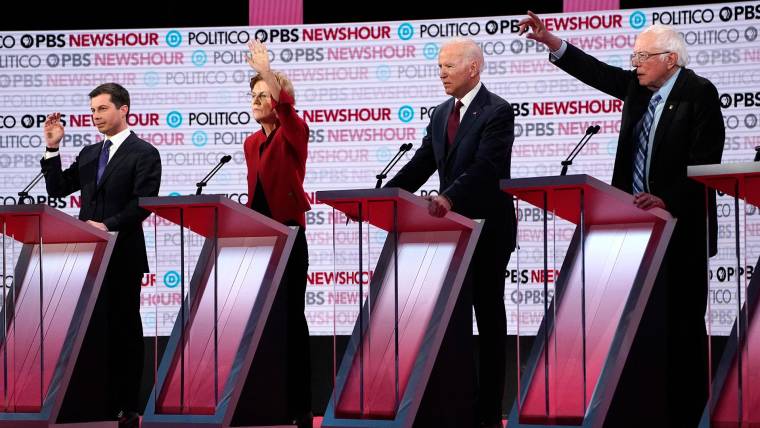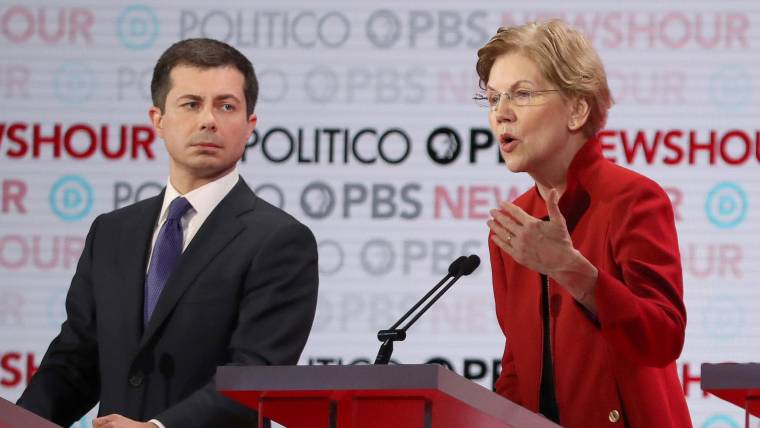WASHINGTON — A day after the House impeached President Donald Trump, the Democratic presidential contenders made their cases for why they are best suited to take him on next year.
With the field of candidates on the debate stage Thursday night in Los Angeles narrowed to seven, there was more room for head-to-head conflict among contenders, with the bottom tier fighting to break into the top ranks and the top tier looking to break away from the pack.
With less than two months before voters begin weighing in, here’s a look at who landed their punches, who weathered the blows and who might have had their last moments on the debate stage.
Let our news meet your inbox. The news and stories that matters, delivered weekday mornings.
South Bend, Indiana, Mayor Pete Buttigieg: Since jumping to the top tier of candidates last month, Buttigieg has faced increased scrutiny, with attacks on his limited experience and fundraising practices. But he appeared ready to counterpunch. When Sen. Elizabeth Warren of Massachusetts accused him of being susceptible to influence by wealthy donors, Buttigieg accused Warren of “issuing purity tests you cannot yourself pass,” saying her net worth was 100 times his own. When Sen. Amy Klobuchar of Minnesota attacked his lack of electoral experience, he held up his ability to get elected as a “gay dude in Mike Pence’s Indiana” as proof that he could pull together a winning coalition.
Sen. Amy Klobuchar, D-Minn.: Her poll numbers have yet to break out of the single digits, but Klobuchar has hung on, battling her way onto debate stage after debate stage. She had strong moments — and she went directly after Buttigieg, the other Midwestern centrist on the stage, accusing him of denigrating her experience and of being unable to win a major election. But she also went “Minnesota nice,” stepping in several times to break up heated exchanges among the other candidates.
Former Vice President Joe Biden: After months of attacks from Trump over his son’s business dealings in Ukraine, Biden has shown resilience at the top of the primary polls. But despite his front-runner status, Biden took few arrows from his rivals, nor did he launch many at them, saving most of his attacks for the president. His most heated exchange was an argument with Sen. Bernie Sanders, I-Vt., once again, that so-called Medicare for All plans would lead to higher taxes.
Sen. Elizabeth Warren, D-Mass.: Warren, who has seen Buttigieg eat into her support, came ready to hit him hard. “Billionaires in wine caves should not pick the next president of the United States,” she said, echoing her recent trail attacks on his fundraising approach. In general, she largely continued the pattern of past debates: She and her fellow progressive Sanders continued to observe their apparent non-aggression pact as she kept her focus on taxing billionaires and corporations and largely avoided criticism over her health care plan.
Sen. Bernie Sanders, I-Vt.: Over the past few months, Sanders has weathered both a heart attack and a surge by Warren, neither of which have knocked him out of the top tier. On Thursday, Sanders had another consistent debate performance, throwing in some of the personal detail his team has urged him to share on the trail this year: When asked about Israel policy, he talked about having lived there as a young man and about his pride in his Jewish identity, while saying: “It’s not enough to be pro-Israel. We need to be pro-Palestinian, too.”
Download the NBC News app for breaking news and politics
Tech entrepreneur Andrew Yang: Yang had some of the more memorable one-liners in past debates, and once again he got some of the biggest laugh lines. (“I know what you’re thinking, America,” he said Thursday. “How am I still on this stage with them?”) But he’s failed to make progress in demonstrating that he has the policy chops of the other candidates. With fewer candidates on the stage, Yang had more speaking time on issues like foreign affairs and climate change, which he kept focused on his campaign theme of how technology will affect the future.
Businessman Tom Steyer: Steyer, a billionaire who has avoided the cash crunch that has pushed more seasoned politicos out of the race, aimed once again to sell himself as the candidate most focused on climate change — but he didn’t break through on other issues. A big question heading into Thursday night was whether he would have a ready explanation for precisely why he’s running. Voters may have ended the night without clarity.













